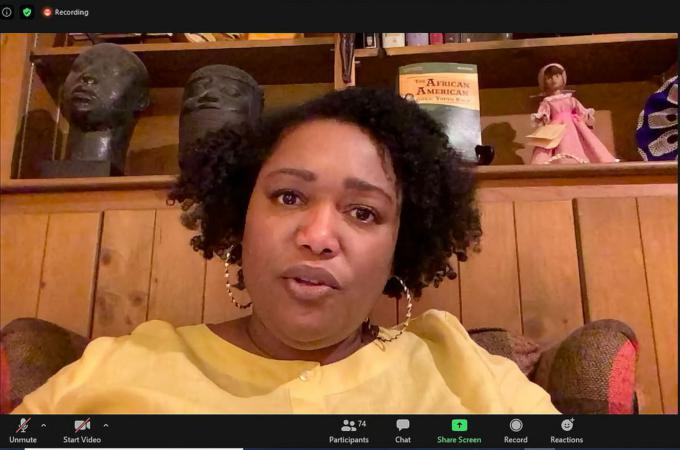Past Healy and Ruffin Award recipients honored at virtual celebration
BRAINTREE -- In light of the coronavirus pandemic, the Black Catholic Ministries of the archdiocese held a virtual celebration on Nov. 14 in lieu of their annual Bishop James Augustine Healy dinner. The hour-long event honored all past Bishop James Augustine Healy Award and Robert Leo Ruffin Award recipients.
Named for the first Black Catholic bishop in the United States, the Healy Award is presented to practicing Black Catholics who have shown effective leadership and service in their community. The Ruffin Award, named for a prominent Black Catholic layman from Boston, honors practicing Catholics who serve the Black Catholic community and foster educational and mentorship opportunities.
Cardinal Sean O'Malley offered welcoming remarks, and Father Paul Soper, who is the archdiocese's secretary for evangelization and discipleship, gave a blessing at the end of the program.
Between the program's speakers, Byron Wratee of St. Katharine Drexel Parish sang traditional spirituals, including "Keep Your Lamps Trimmed and Burning" and "What a Friend We Have in Jesus," with parish liturgical music director Meyer Chambers providing musical accompaniment.
This year's celebration was dedicated to the memory of Father Russell W. Best and civil rights activist Mamie "Mimi" Jones. Lorna DesRoses, evangelization consultant of the Black Catholic Ministries, shared remarks about their respective lives and legacies.
Born in Boston in 1957, Father Best grew up as a parishioner of the Cathedral of the Holy Cross and a student of Cathedral High School. In 1986, he was ordained to the priesthood, becoming the first African American to be ordained for the Archdiocese of Boston in approximately 25 years. Father Best served as a campus chaplain for Cathedral High School and Matignon High School, as well as the pastor of St. John-St. Hugh Parish, which later became St. Katharine Drexel Parish. He received the Healy Award in 2009.
Several years ago, Father Best developed cancer, which spread to his brain and caused him to lose most of his eyesight. He died on April 15 of this year. DesRoses said that even as Father Best's health declined, he remained "a pastoral presence in many people's lives."
"Whether it was simply the act of listening to them, praying with and for them, he was there. So even until the end, Father (Best) felt that his calling was to be a priest, a priest forever," DesRoses said.
Mamie "Mimi" Jones was born in Georgia in 1947 and became active in the civil rights movement as a teenager. She taught people to read so they could take tests to vote, and she traveled across the country to raise money for the March on Washington.
In 1964, Jones and a few other Black individuals jumped into a whites-only pool at a motel as an act of protest. The manager responded by pouring acid into the water. The photographs of this incident are believed to have spurred the passage of the Civil Rights Act that year.
Jones earned a degree in political science at the University of Massachusetts in Boston. She worked for the Department of Education for many years and helped small nonprofits write grant proposals. She died in July at the age of 73.
"Mimi had a strong belief that any gift that God gave you, you were not to just squander it and hold on to it for yourself. You were to share that gift for the good and the benefit of the community," DesRoses said.
The virtual celebration's keynote speaker was Gloria Purvis, host of "Morning Glory," a Catholic morning radio show produced by EWTN.
Purvis said it was a "happy coincidence" that the event was taking place on Nov. 14, the feast of All Carmelite Saints and Souls, since Carmelites pray for the needs of the Church.
"Some of the criteria for tonight's recipients certainly line up with the needs of the Church. You see, we do need people serving and evangelizing the Black community, and we also need people who are concerned with the unity of the Church," Purvis said.
She spoke about how racism has posed a challenge to unity in the Church. She said this was evident in the life of Bishop Healy, who had to hide his Black heritage.
"Although his heritage was hidden, it has not been forgotten, and so we as Black Catholics embrace him as one of our own," Purvis said.
She also spoke about Robert Ruffin, who was born just a few years before the Civil War. He led the Boston delegation to the first National Black Catholic Congress, which took place in 1889 in Washington, DC.
Purvis said she marveled at the congress' call for Catholic schools for Black children, and that she was reminded of Servant of God Mary Lange, the founder of the Oblate Sisters of Providence, whose charism was to evangelize and educate Black children. Purvis called herself a product of Ruffin and Lange's work, since she herself attended a Black Catholic school. She said it was their efforts that led her to the Catholic Church and the Third Order Carmelites.
Purvis said that although the pandemic prevented the event attendees from gathering in person, she hoped they would have the same celebratory spirit as in years past.
"The fact that these awards have been given out for more than 20 years is itself a cause for celebration," Purvis said, because "it means efforts to serve the Black Catholic community have been sustained. It means there are a variety of people endeavoring to meet the Church's needs in the Black community."
The evening ended with a rendition of "Lift Every Voice and Sing," considered to be the Black national anthem.



















